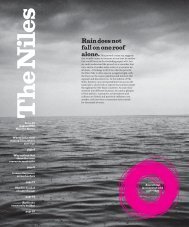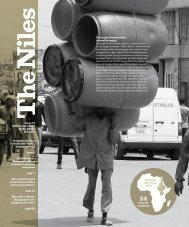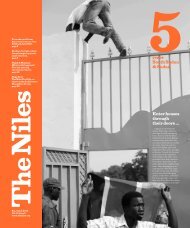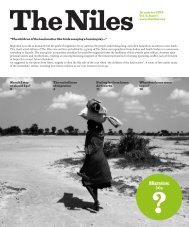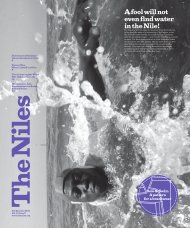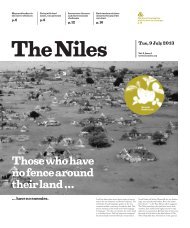When deeds speak, words are nothing
Speaking about sustainable development is easy. Acting sustainably is another matter. And now the evidence is unequivocal: Mankind’s impact on nature is causing the climate to change rapidly and drastically, threatening the environment and the very resources we need to survive. Aware that humanity is careening close to the edge, The Niles correspondents set out to explore where and how people in the Nile Basin region rethink. So much of their findings for now: We are an endlessly innovative species. Cooperation is our superpower. When deeds speak, words are nothing.
Speaking about sustainable development is easy. Acting sustainably is another matter. And now the evidence is unequivocal: Mankind’s impact on nature is causing the climate to change rapidly and drastically, threatening the environment and the very resources we need to survive. Aware that humanity is careening close to the edge, The Niles correspondents set out to explore where and how people in the Nile Basin region rethink. So much of their findings for now: We are an endlessly innovative species. Cooperation is our superpower. When deeds speak, words are nothing.
Create successful ePaper yourself
Turn your PDF publications into a flip-book with our unique Google optimized e-Paper software.
Dagim Terefe
Addis Ababa, Ethiopia
Wind turbines in Adama,
Ethiopia.
Photo: CIFOR / Ollivier Girard
Rethinking investments in energy
Climate change is a severe threat that
is impacting energy-hungry poor economies.
However, the idea of integrating sustainability
considerations into investment processes
could contribute to the UN’s Deep Decarbonisation
Pathways Project (DDPP) goal of
achieving a net-zero emission by 2050.
Technologies that address climate change,
like green energy and sustainable transport,
are likely to profit as investors look for options
that remove carbon from the world. For
instance, Ethiopia is generating green power
from the GERD. In the meantime, the reservoir
could be used for floating solar photovoltaic
systems that would boost the energy
generating capacity.
According to a World Bank report investing
in floating solar photovoltaic is effective,
especially in countries with high population
density and competing uses for available land.
The advantages of floating over land-based
solar systems include higher energy yield, reduced
evaporation, and improved water quality.
On the other hand, investors need to consider
climate-related mitigation and adaptation
strategies in an active way to develop climate
resilience and manage climate risks in their
portfolios. Policymakers need to create a mechanism
to make it effective and thus benefit
all Nile riparian states. And, the urgently
needed effective action on climate change
investments requires a coordinated mechanism
by all Nile Basin nations.
“Climate
services enable
decision-makers
to manage risks.”
What the NBI has worked on so far
As the one and only existing Nile Basin
organisation, the NBI has commissioned many
studies at sub-basin and basin-wide levels
to improve the understanding of the water
resources and socio-economic situation,
vulnerability to climate change, appropriate
coping measures and development options.
It has also supported science-policy dialogue,
strengthening basin monitoring and planning
tools, and facilitating the expansion
of water and power infrastructures.
NBI’s Climate Services feature collected
information and data from all Nile Basin
countries, except Egypt and Tanzania, on
various water-related sectors like energy,
agriculture and infrastructure (dams, irrigation
schemes, etc.). The aim is to “make
decision-makers and their technical support
structures use Climate Services in planning
and climate risk assessment in infrastructure
investment”.
According to the NBI’s Climate Services
for Infrastructure Baseline Assessment report,
climate services enable public and private
decision-makers to manage climate risks and
opportunities and raise the resilience of national
infrastructures. Many countries within
the Nile Basin region so far lack the institutional,
technical and service-related capacity they
need to set up and mainstream climate services
in their planning procedures and regulations,
the report commends.
NBI is also working on drought monitoring
with the Nile Basin River Flow Forecasting
System (NB-RFFS). The report is automatically
generated by the Flood and Drought Data
Portal, which contains the latest satellite imagery
used to monitor precipitation, soil moisture,
and vegetation health to support the drought
early warning system.
9









